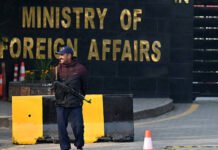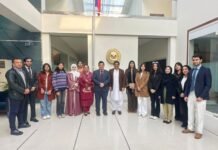Washington DC, 5 July 2022 (TDI): Secretary of State Antony J. Blinken congratulated on 47 years of Cabo Verde’s independence. Independence Day is a public holiday in Cabo Verde, celebrated annually on July 5th.
The National Day of Cabo Verde marks the independence of the country from Portugal on this day back in 1975.
US-Cabo Verde Relations
The United States and Cabo Verde share democratic, security, and economic aspirations. Both countries have had a relationship for nearly 200 years.
They anticipate that this relationship will only get stronger in the future years. The United States is pleased to join Cabo Verde in commemorating another year of freedom.
Shortly after Cabo Verde gained independence on July 5, 1975, the United States established full diplomatic ties with the Republic of Cabo Verde. Since 1978, it has had a resident Embassy in Praia.
The United States maintains an Embassy in Cabo Verde to preserve American national interests, support democracy, and human rights, foster strong and productive relations, offer consular services and humanitarian aid, and expand bilateral trade and people-to-people interactions.
The consular division is one of the more unusual aspects of US relations with Cabo Verde. The population of Cabo Verdean-Americans in the United States is nearly equal to the population of Cabo Verde itself.
These family relationships, remittances, visits, and emigration have a significant impact on the Embassy’s activities.
History of Independence Day of Cabo Verde
Cabo Verde is an island country in the Atlantic Ocean off the coast of Northwest Africa made up of ten volcanic islands. When Portuguese navigators discovered the islands in the middle of the 15th century, they were deserted.
The first permanent European settlement in the tropics was established by Portuguese settlers in 1462.
The islands benefited from their location as a resupply point for ships going into the Pacific.
Cabo Verde’s nationalism movement was intertwined with that of Portuguese Guinea, the second Portuguese territory in the region. Amilcar Cabral, a Guinean, founded the African Party for the Independence of Guinea and Cabo Verde in 1956. (PAIGC).
The PAIGC’s goals were to better the economic, social, and political circumstances in Cabo Verde and Portuguese Guinea, and it served as the foundation for the two countries’ independence movements.
These demands erupted into a war on the African continent, culminating in the independence of Portuguese Guinea in 1973.
The April 1974 revolution in Portugal resulted in a shift in Portugal’s attitude toward its overseas territories, and in 1974, the PAIGC and Portugal reached an agreement establishing a transitional administration comprised of Portuguese and Cabo Verdeans.
On June 30th, 1975, Cabo Verdeans elected a National Assembly which received the instruments of independence from Portugal on July 5th, 1975.








